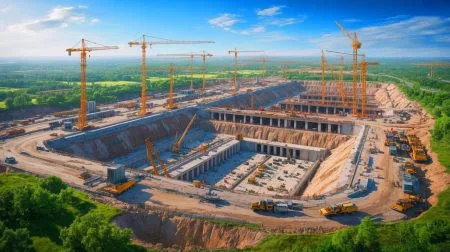| IN A NUTSHELL |
|
As the global climate crisis intensifies, scientists and policymakers are seeking innovative solutions to mitigate its impacts. Recent debates have centered around strategies such as geoengineering and renewable energy adoption. While some view these approaches as viable paths forward, others warn of potential unintended consequences. The conversation is increasingly urgent as environmental changes become more pronounced, affecting ecosystems, economies, and communities worldwide. This article delves into the latest research and opinions on these critical topics, exploring the complexities and potential of each proposed solution. By examining the benefits and risks, we can better understand the broader implications for our planet’s future and the actions needed to address these pressing challenges.
The Promise and Perils of Geoengineering
Geoengineering, the deliberate manipulation of the Earth’s climate systems, has emerged as a controversial topic in climate discourse. Proponents argue that it could offer a temporary reprieve from the escalating impacts of climate change, buying time for more sustainable solutions. Techniques such as solar radiation management aim to reflect sunlight away from the Earth, potentially reducing global temperatures.
However, critics highlight the significant risks associated with geoengineering. Unintended consequences could arise, such as disruptions to weather patterns and negative impacts on biodiversity. Moreover, reliance on geoengineering might deter efforts to reduce greenhouse gas emissions, delaying the adoption of necessary systemic changes. The ethical concerns surrounding the manipulation of natural systems also warrant careful consideration.
Geoengineering is not going to save the poles from climate change.
As we navigate these complex issues, it becomes clear that while geoengineering may offer short-term relief, it is not a panacea for the broader climate crisis. Long-term solutions must focus on reducing emissions and enhancing resilience across ecosystems and communities.
Debating the Viability of Solar Power
Solar power has long been championed as a sustainable and renewable energy source capable of reducing reliance on fossil fuels. Advances in solar technology have made it more efficient and affordable, with the potential to provide a significant portion of the world’s energy needs. Unlike fossil fuels, solar energy is abundant and emits no greenhouse gases during operation, making it an attractive option for addressing climate change.
Despite its benefits, solar power faces challenges that must be addressed to maximize its potential. One major hurdle is the intermittent nature of solar energy; it is not consistently available due to weather conditions and day-night cycles. This limitation necessitates the development of reliable energy storage solutions to ensure a steady power supply. Additionally, the production and disposal of solar panels can have environmental impacts that need careful management.
Why solar power is the only viable power source in the long run is a question weighed against these challenges. The transition to a solar-powered future requires comprehensive strategies that include technological innovation, infrastructure investment, and supportive policy frameworks. By addressing these issues, solar power can become a cornerstone of a sustainable energy system.
Understanding Termination Shock and Its Implications
The concept of “termination shock” refers to the potential rapid reversal of climate interventions, such as geoengineering, and the resulting abrupt changes in climate systems. This phenomenon poses a significant risk, as sudden shifts could exacerbate the very issues these interventions aim to mitigate. The potential for termination shock underscores the importance of cautious and well-regulated approaches to climate solutions.
Researchers are exploring the mechanisms behind termination shock to better predict and manage its effects. These studies emphasize the interconnectedness of global climate systems and the need for international collaboration in addressing climate challenges. As we develop and implement climate interventions, it is essential to consider their long-term impacts and the potential for unintended consequences.
Is Earth’s climate in a state of ‘termination shock’? This question prompts further investigation into the resilience of natural systems and the strategies needed to support them. By understanding the dynamics of termination shock, we can better prepare for and adapt to future climate scenarios.
Addressing the Green Backlash
The transition to more sustainable practices has not been without its challenges, including the emergence of a “green backlash.” This term describes resistance to environmental initiatives, often driven by economic concerns or political ideologies. Understanding the roots of this backlash is crucial for developing effective strategies to address climate change and build consensus around necessary actions.
Research indicates that clear communication and inclusive policymaking are essential in overcoming resistance. By engaging diverse stakeholders and addressing legitimate concerns, policymakers can foster broader support for environmental initiatives. Additionally, demonstrating the tangible benefits of sustainability, such as job creation and improved public health, can help mitigate opposition.
Exciting new research shows ways to defuse the “green backlash.”
By focusing on these strategies, we can create a more unified and effective approach to tackling climate change. The challenge lies in balancing the urgent need for action with the diverse perspectives and interests of affected communities.
As we confront the complex challenges of climate change, it is clear that no single solution will suffice. A multifaceted approach is necessary, combining technological innovation, policy reforms, and community engagement. The ongoing debates around geoengineering, solar power, and the green backlash highlight the need for thoughtful consideration and collaborative action. As we move forward, how will we balance the immediate needs of our planet with the long-term implications of our actions?
Did you like it? 4.4/5 (28)







Is this really possible? Can geoengineering actually reverse the climate crisis, or is it just a sci-fi fantasy? 🤔
This is terrifying! How did we not see this coming sooner?
Wow, this is terrifying! I always thought geoengineering was risky, but I didn’t know it could lead to such catastrophic outcomes.